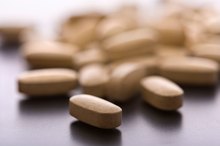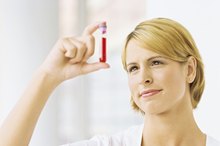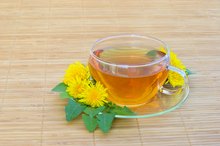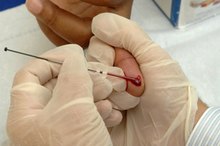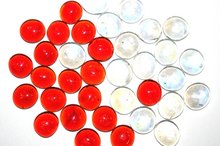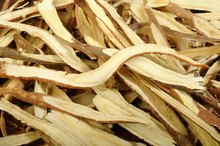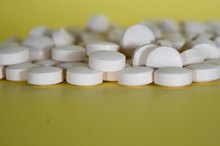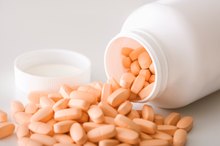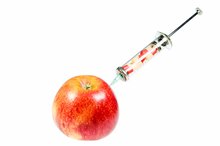Supplements for a Low White Blood Cell Count
Reduced numbers of white blood cells, also known as leukopenia, means that you have fewer disease-fighting cells circulating throughout your body. Fewer than 3,500 white blood cells, or leukocytes, per microliter of blood is considered a low white blood cell count, although this number varies based on age and sex. Certain dietary supplements may help boost your white blood cell counts, although you should only use supplements under the care and supervision of a health care professional.
Low White Blood Cell Count
There are five principle types of white blood cells, states MedlinePlus, including eosinophils, basophils, monocytes, lymphocytes and neutrophils. Certain prescription drugs, such as antibiotics, antihistamines and chemotherapy drugs, may lower your white blood cell count. Other possible causes of reduced white blood cell counts include viral infections, congenital disorders, cancer and autoimmune disorders. Specific causes of low white blood cells counts include hyperthyroidism, vitamin deficiencies, myelofibrosis and HIV/AIDS. A simple blood test can assess your white blood cell count.
- There are five principle types of white blood cells, states MedlinePlus, including eosinophils, basophils, monocytes, lymphocytes and neutrophils.
- Specific causes of low white blood cells counts include hyperthyroidism, vitamin deficiencies, myelofibrosis and HIV/AIDS.
Commonly Used Supplements
Supplements That Lower Uric Acid
Learn More
Certain supplements, especially herbal supplements, are commonly used to boost or maintain white blood cell counts. Dr. Sharol Tilgner, a naturopathic physician and author of "Herbal Medicine From the Heart of the Earth," reports that astragalus, ligustrum, schisandra, licorice, atractylodes, Siberian ginseng and codonopsis may be particularly effective in raising your white blood cell count and supporting your immune system. Not all supplements used in treating leukopenia have been subjected to extensive clinical trials.
Featured Supplement
Ligustrum is a frequently prescribed supplement to help increase your white blood cell count. Tilgner notes that ligustrum may be able to help elevate your leukocyte numbers following radiation therapy or chemotherapy. Ligustrum, states the Memorial Sloan-Kettering Cancer Center, helps stimulate your immune function and may aid in treating insomnia, fever and dizziness. Ligustrum is a type of tree native to certain parts of China. The tree's fruit is used medicinally.
- Ligustrum is a frequently prescribed supplement to help increase your white blood cell count.
- Ligustrum, states the Memorial Sloan-Kettering Cancer Center, helps stimulate your immune function and may aid in treating insomnia, fever and dizziness.
Additional Information
Herbs to Increase White Blood Cells
Learn More
A low white blood cell count may be cause for concern. If a blood test reveals below normal levels of white blood cells, meet with your physician to discuss possible underlying factors and treatment methods to address your health problem. Dietary supplements, though intended to help elevate your leukocyte levels, should not be used in place of other therapies recommended by your health care provider. In most cases, dietary supplements should be used as an adjunct therapy in the treatment of low white blood cell counts.
- A low white blood cell count may be cause for concern.
- In most cases, dietary supplements should be used as an adjunct therapy in the treatment of low white blood cell counts.
Related Articles
References
- MedlinePlus: WBC Count
- "Herbal Medicine From the Heart of the Earth"; Sharol Tilgner, N.D.; 1999
- Memorial Sloan-Kettering Cancer Center: Ligustrum Lucidum
- Chen L, Xu X, Zhang Y, Peng J, Zhou K, Wang J. Detection of EDTA-induced pseudo-leukopenia using automated hematology analyzer with VCS technology. Clinical Chemistry and Laboratory Medicine. 2018;56(8):e204-e206. doi:10.1515/cclm-2017-1173
- Atallah-Yunes SA, Ready A, Newburger PE. Benign Ethnic Neutropenia. Blood Reviews. 2019. 37:100586. doi:10.1016/j.blre.2019.06.003
- Chen L, Xu X, Zhang Y, Peng J, Zhou K, Wang J. Detection of EDTA-induced pseudo-leukopenia using automated hematology analyzer with VCS technology. Clinical Chemistry and Laboratory Medicine. 2018;56(8):e204-e206. doi:10.1515/cclm-2017-1173
- Riley LK, Rupert J. Evaluation of patients With leukocytosis. American Family Physician. 2015;92(11):1004-11.
- Shi X, Sims MD, Hanna MM, et al. Neutropenia during HIV infection: Adverse consequences and remedies. International Reviews in Immunology. 2014:33(6):511-36. doi:10.3109/08830185.2014.893301
- Hirosawa T, Harada Y, Morinaga K, et al. Eosinopenia as a diagnostic marker of bloodstream infection in a general internal medicine setting: a cohort study. BMC Infectious Disease. 2020;20:85. doi:10.1187/s12879-020-4814-5
- Zidar DA, Al-Kindi SG, Liu Y, et al. Association of lymphopenia with risk of mortality among adults in the US general population. JAMA Network Open. 2019;2(12):e1916526. doi:10.1001/jamanetworkopen.2019.16526
- Tan L, Wang Q, Zhang D, et al. Lymphopenia predicts disease severity of COVID-19: a descriptive and predictive study. Signal Transduction and Targeted Therapy. 2020. 5:33 doi:10.1038/s41392-020-0148-4
- Leukemia and Lymphoma Society. Normal blood counts.
- American Cancer Society. Understanding your lab test results.
- Dale DC. How I diagnose and treat neutropenia. Current Opinions in Hematology. 2016;23(1):1-4. doi:10.1097/MOH.0000000000000208
- Estcourt LJ, Stanworth SJ, Hopewell S, et al. Granulocyte transfusions for treating infections in people with neutropenia or neutrophil dysfunction. Cochrane Database of Systematic Reviews. 2016. 2016(4):CD005339. doi:10.1002/14651858.CD005339.pub2
- Kliegman, RM, St. Geme, J. Nelson Textbook of Pediatrics. London, UK: Elsevier Health Sciences; 2019.
- National Cancer Institute. Seer Training Modules. Composition of the blood. Updated 2019.
- Savitskly A, Rudnov V, Bagin V. Eosinopenia as a marker of sepsis and mortality in critically ill patients. Critical Care. 2015;19(Suppl 1): P47. doi:10.1186/cc14127
- Yokus O, Gedik H. Etiological causes of pancytopenia: a report of 137 cases. Avicenna J Med. 2016;6(4):109-112. doi:10.4103/2231-0770.191447
Writer Bio
Martin Hughes is a chiropractic physician, health writer and the co-owner of a website devoted to natural footgear. He writes about health, fitness, diet and lifestyle. Hughes earned his Bachelor of Science in kinesiology at the University of Waterloo and his doctoral degree from Western States Chiropractic College in Portland, Ore.
